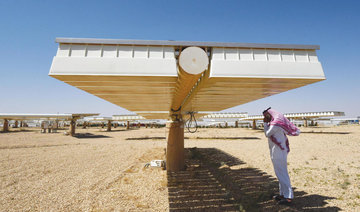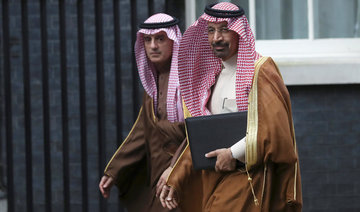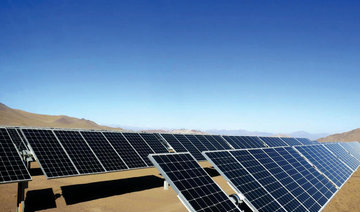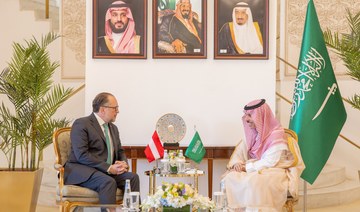LONDON: From “harvesting fog” in Oman to vertical farming in Dubai, Gulf states are looking beyond solar power in the race to develop innovative renewable technologies.
A surge in investment, triggered by a regionwide economic diversification push, is helping to transform the region into an unlikely global hub for renewables innovation.
Dubai utility DEWA this year signed an agreement to study plans to build a 400MW pumped hydro storage power station — using water from Hatta Dam to generate hydro-electric power from water pumped using solar-powered turbines.
It forms part of the Dubai Clean Energy Strategy 2050 which aims to make the emirate a global hub for the green economy and source 75 per cent of its total power output from clean energy.
But it is only one of dozens of major renewable energy projects under way as the huge investment program in solar and offshore wind power in the region extends to other technologies.
“As renewable energy costs decline, technology advances and deployment accelerates around the world, we are entering a new age of energy transformation, with renewable energy becoming a significant driver of economic growth, job creation, and socioeconomic development,” said Adnan Amin, director-general of the International Renewable Energy Agency (IRENA).
Urbanization in the Gulf is also spurring investment as the region’s big cities warm up.
 Arup, the London-based engineering consultancy, warns that “arid” cities need to innovate more or become less habitable, as they become drier.
Arup, the London-based engineering consultancy, warns that “arid” cities need to innovate more or become less habitable, as they become drier.
Its report “Cities Alive: Rethinking Cities in Arid Environments,” argues that as air conditioning has enabled the growth of arid cities, many are seeing an “urban heat island effect,” where they become hotter than the surrounding rural areas, increasing water use and accelerating energy consumption.
The report urges cities to adopt measures such as industrial-scale fog and dew harvesting and cooling pavements that can reduce ambient temperatures by up to 7 degrees, as well as building more energy-efficient buildings.
“Cities in arid regions are expected to experience the highest rates of natural population growth and urbanization in the coming century. Yet most are still being planned and designed based on a global city-making paradigm from the 1950s. Cities need to adopt strategies that combine technological innovation with locally adapted and climatically appropriate solutions,” said Hrvoje Cindric, an associate at Arup.
Many cutting-edge renewables technologies are being developed at Masdar City in Abu Dhabi.
Masdar City includes IRENA’s headquarters and the new Masdar Institute and aims to be the first city to operate without fossil-fueled vehicles at street level.
“The region will be exploring different applications but they will always be secondary to wind and solar. This is where the main investment is,” says Zoheir Hamedi, MENA program officer at IRENA.
The Indian Ocean coast of Oman is seen as offering strong potential for wind power, as is Saudi Arabia’s northern quarter.
But Hamedi also points to the potential which bio-energy could offer as a renewable energy source in the region.
On this front, The Emirates Waste to Energy Company, a joint venture between Masdar and Bee’ah, signed terms earlier this year with CNIM on a design, build and operate agreement for the first waste-to-energy facility in the UAE in Sharjah.
Due for completion by 2020, the plant will treat more than 300,000 tons of municipal solid waste each year and generate around 30MW of electricity.
Meanwhile, in January, Dubai Municipality signed a 2.5 billion dirhams ($680,700) contract to build a major new waste-to-energy plant at Warsan which will treat 1.82 million tonnes of waste annually and generate some 185MW of electricity.
Swiss engineering company HZI and Belgian firm Besix Group are expected to start construction this year and the plant is expected to be partially operating by 2020.
Geothermal energy also offers potential in the region, particularly in Saudi Arabia, where a study has highlighted the scope for generating energy from a series of hot springs in the Al-Khouba area of Jizan province in the south west of the country.
Fog harvesting using vast vertical sheets of canvas has proved a useful source of water in areas of scarcity such as Morocco.
The Sustainability Pavilion at the Dubai Expo 2020 will use structures that generate solar energy and capture water from humidity in the air to supply much of its water needs.
Fog technology could be useful in KSA, which combines low rainfall with high per-capita water consumption. Data collected over a year at the Rayda reserve weather station suggested fog could provide a supplementary water supply for the agriculture sector in the south west of the Kingdom, according to research in Water and Environment Journal.
Fog collection projects have also been installed in desert areas worldwide, including Oman and Eritrea.
Meanwhile, to accelerate dew harvesting techniques, the partners of the SunGlacier Challenge recently invited teams of universities worldwide to make water from the air.
The growth of renewable energy will also increase the need for innovative energy storage methods.
“New technologies in energy storage will come to the fore, develop, evolve and become more cost-competitive,” said Dietmar Siersdorfer, chief executive of Siemens Middle East, in a recent report.
Hydrogen is seen as a ripe solution for energy storage from a range of a few kilowatts to gigawatts, for several weeks.
Decentralised systems will also allow power users in industry to produce energy independently for their facilities, reducing transmission losses and carbon emissions.
The Siemens report also highlights energy efficiency as a major area for growth in the region, potentially generating savings of up to 30 per cent.
It also notes the rise in energy efficiency services companies (ESCOs) in the region.
The UAE already has about 30 such companies, more than half of them based in Dubai.
Regional governments have stepped up efforts to remove subsidies in the energy sector in recent years as part of a broader push to wean Gulf economies off oil dependence.
However subsidies remain in place in some countries, which can deter investment in renewables, according to analysts.
“The whole thing needs to be re-thought with a proper plan,” said Rahmat Poudineh, lead senior research fellow, electricity at the Oxford Institute for Energy Studies.
For renewable resources to be integrated economically into the existing energy market, electricity tariffs need to be reformed. Letting renewables compete with existing sources of energy, on a level playing field, is the key issue, he said.
The region also needs to invest in energy efficiency. “Saving 1KWh (kilowatt-hour) of energy is much cheaper than producing 1KWh of clean energy,” Poudineh said.
Gulf states look beyond solar with foggy renewable vision
Gulf states look beyond solar with foggy renewable vision

- Fog harvesting, hydro-electricity and waste-to-energy are among the innovative technologies rolling out in the region
- The growth of renewable energy will also increase the need for innovative energy storage methods.
RIYADH: The Kingdom’s Industry and Mineral Resources Minister Bandar Ibrahim AlKhorayef has held talks with officials at the Dutch Port of Rotterdam on ways to enhance cooperation in logistics, the Saudi Press Agency reported on Wednesday. They discus

- Discussions touched on encouraging Dutch infrastructure investments for metal processing in the Kingdom
RIYADH: The Kingdom’s Industry and Mineral Resources Minister Bandar Ibrahim AlKhorayef has held talks with officials at the Dutch Port of Rotterdam on ways to enhance cooperation in logistics, the Saudi Press Agency reported on Wednesday.
They discussed the role of the Kingdom, as a supplier of vital minerals, in the global supply chain, and investment cooperation with Dutch companies in metal processing and recycling.
AlKhorayef reviewed the objectives of the National Industrial Development and Logistics Program, under Saudi Vision 2030, which focuses on developing this sector of the Kingdom’s economy.
The minister also toured the port’s FutureLand area where he was briefed on the services provided to shipping companies which includes towing, docking, repairs, building and supply.
Saudi Arabia and Austria sign MoU for economic cooperation

VIENNA: Saudi Arabia’s economy ministry and its Austrian counterpart signed a memorandum of understanding to boost economic cooperation between the two nations.
The Saudi Ministry of Economy and Planning Austria’s Ministry of Labor and Economy in the deal on the sidelines of the Saudi-Austrian Joint Committee held in the Austrian capital.
The MoU was signed by the Saudi Minister of Economy and Planning Faisal bin Fadel Al-Ibrahim, and the Austrian Minister of Labor and Economy, Martin Kocher.
The MoU aims to diversify and strengthen economic ties, exchange experiences and information, and encourage cooperation in a number of fields, including trade, industry, research and development, tourism, small and medium enterprises.
Among the content of the MoU is the organization of conferences, seminars and the exchange of visits between experts, in addition to cooperation between government institutions and the private sector.
The parties are also committed to protecting intellectual property rights and exchanging information for the purposes specified in the MoU.
This MoU comes within the framework of a cooperation agreement in the economic, commercial, industrial and technical fields signed between the two governments in 2004.
Xi calls for more jobs for youth, migrant workers

- (We should) insist that employment of young people including college graduates is a top priority: Chinese president
BEIJING: China’s President Xi Jinping called on Monday for efforts to promote high-quality and sufficient jobs for college graduates and migrant workers, while presiding over a Politburo group study session, state media Xinhua reported on Tuesday.
“(We should) insist that employment of young people including college graduates is a top priority,” the Xinhua report quoted Xi as saying at a group study session of the Politburo, a top decision-making body of the ruling Communist Party.
The Xinhua report did not give details on job promotion support measures or plans.
The survey-based jobless rate for 16-24 year-olds, excluding college students, was 14.7 percent in April, down from 15.3 percent in March, official data showed last week.
China’s statistics bureau revised its methodology by removing college students from the survey pool after youth jobless rate surged to around 20 percent last year.
Xi also said the government should take steps to promote the employment of migrant workers, guide them to return to their hometowns and for people to start businesses in the countryside.
He called for stabilizing the income of people who had been lifted out of poverty and preventing large-scale return to poverty due to unemployment, Xinhua said.
Companies and industries with strong job creation capabilities will be supported, the report said.
China created 4.36 million new urban jobs in the first four months, Human Resources Ministry data showed, 36 percent of its annual job creation target.
Saudis spent more money on electronic devices during the 4th week of May: SAMA data

RIYADH: Saudi Arabia’s point-of-sale spending reached SR11.2 billion ($2.98 billion) in the fourth week of May, official figures showed.
The latest data from the Saudi Central Bank, also known as SAMA, revealed that spending on electronic and electric devices surged by 9.5 percent to reach SR240.4 million.
Beverages and food, which accounts for the largest share at 14.9 percent, saw a 5.9 percent decline, reaching SR1.66 billion, during the week from May 19 to 25.
Meanwhile, transactions at restaurants and cafes, holding a 14.6 percent share, recorded a slower decline of 4.8 percent, amounting to SR1.64 billion.
Saudi spending on miscellaneous goods and services, including personal care items, supplies, maintenance, and cleaning, constituted the third-highest share and witnessed a 5.1 percent decline that week, reaching SR1.36 billion.
Despite composing only 1 percent of the week’s overall POS value, spending on education recorded a minimal increase of 0.1 percent to SR152.48 million.
In the past few years, this sector has been allocated the largest share of government expenditure in comparison to other divisions of the economy.
Efforts are underway to revamp the education system, aiming to equip the national workforce with the necessary skills to thrive in a technological and information-centric global economy.
The hotel sector experienced the largest decline in POS transaction value, dropping 10.9 percent to SR227.13 million.
According to data from SAMA, 35.44 percent of POS spending occurred in Riyadh, with the total transaction value reaching SR3.97 billion. However, this represents a 1.6 percent decrease from the previous week.
Riyadh has undergone considerable expansion, evolving into a pivotal center for growth and progress. The city is witnessing a surge in new businesses setting up operations, drawn by its vibrant economic landscape and strategic prospects for investment and innovation.
Spending in Jeddah followed closely, accounting for 14.3 percent of the total and reaching SR1.60 billion; however, it marked a 3.1 percent weekly drop.
The two cities that registered the highest declines in POS spending were Makkah and Madinah, with decreases of 11 percent and 6.8 percent, respectively. The value of transactions in Makkah reached SR380.98 million, while in Madinah, it was SR393.26 million.
Saudi healthcare to advance with major digital tech partnership

RIYADH: The Saudi healthcare system is set to advance as two of the country’s major companies partner to leverage digital technologies to enhance the Kingdom’s capabilities.
SAMI Advanced Electronics Co., a wholly owned subsidiary of SAMI, the nation’s defense and digital solutions provider, has signed a cooperation agreement with the National Unified Procurement Co., a Public Investment Fund company.
The agreement, signed on May 27, will provide solutions for medication tracking and IT infrastructure and increase local content through medical devices manufacturing and maintenance.
This partnership demonstrates SAMI-AEC’s unremitting efforts to build a harmonious and applicable healthcare system in Saudi Arabia based on digital technologies.
Ziad Al-Musallam, CEO of SAMI-AEC, commented on the agreement, saying that they are honored to collaborate with NUPCO, as this deal underscores the unwavering commitment of both entities to bolstering efforts aimed at enhancing the healthcare ecosystem in Saudi Arabia.
“At SAMI-AEC, we firmly believe in the significance of augmenting public health services through digital solutions and delivering e-health services. This involves integrating effective, fast technologies to empower the healthcare sector, aligning with the objectives of Saudi Vision 2030,” he said.
Fahad Al-Shebel, CEO of NUPCO, highlighted the agreement’s importance and its role in fortifying the healthcare infrastructure and facilitating access to the integrated technology offered by SAMI-Advanced Electronics Co.
Aiming to upgrade the healthcare sector by improving its facilities in all public hospitals and medical centers in the Kingdom, NUPCO is the country’s largest central company providing medical purchasing, storage, and distribution services for medicines, devices, and supplies.
With a workforce of over 3,320 individuals, 85 percent of whom are Saudi nationals, SAMI-AEC has positioned itself as a leader in electronics, technology, engineering, and manufacturing. Its services span sectors such as defense and aerospace, digital, energy, and security.
Over 800 of the company’s employees are engineers and certified experts, reaffirming the dedication of SAMI-AEC, which was established in 1988, to excellence and innovation.
On the other hand, NUPCO was established in 2009 with SR1.5 billion in capital. It is the leading company in Saudi Arabia in procurement, logistics, and supply chain management for pharmaceuticals, medical devices, and supplies for governmental hospitals.




















